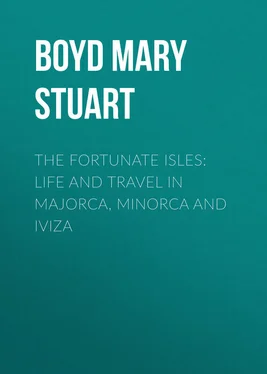Mary Boyd - The Fortunate Isles - Life and Travel in Majorca, Minorca and Iviza
Здесь есть возможность читать онлайн «Mary Boyd - The Fortunate Isles - Life and Travel in Majorca, Minorca and Iviza» — ознакомительный отрывок электронной книги совершенно бесплатно, а после прочтения отрывка купить полную версию. В некоторых случаях можно слушать аудио, скачать через торрент в формате fb2 и присутствует краткое содержание. ISBN: , Жанр: foreign_language, foreign_antique, foreign_prose, Путешествия и география, на английском языке. Описание произведения, (предисловие) а так же отзывы посетителей доступны на портале библиотеки ЛибКат.
- Название:The Fortunate Isles: Life and Travel in Majorca, Minorca and Iviza
- Автор:
- Жанр:
- Год:неизвестен
- ISBN:http://www.gutenberg.org/ebooks/39199
- Рейтинг книги:5 / 5. Голосов: 1
-
Избранное:Добавить в избранное
- Отзывы:
-
Ваша оценка:
- 100
- 1
- 2
- 3
- 4
- 5
The Fortunate Isles: Life and Travel in Majorca, Minorca and Iviza: краткое содержание, описание и аннотация
Предлагаем к чтению аннотацию, описание, краткое содержание или предисловие (зависит от того, что написал сам автор книги «The Fortunate Isles: Life and Travel in Majorca, Minorca and Iviza»). Если вы не нашли необходимую информацию о книге — напишите в комментариях, мы постараемся отыскать её.
The Fortunate Isles: Life and Travel in Majorca, Minorca and Iviza — читать онлайн ознакомительный отрывок
Ниже представлен текст книги, разбитый по страницам. Система сохранения места последней прочитанной страницы, позволяет с удобством читать онлайн бесплатно книгу «The Fortunate Isles: Life and Travel in Majorca, Minorca and Iviza», без необходимости каждый раз заново искать на чём Вы остановились. Поставьте закладку, и сможете в любой момент перейти на страницу, на которой закончили чтение.
Интервал:
Закладка:
The noses of the horses had been pointing directly towards a precipitous cleft in the range of mountains, and almost unexpectedly we entered the valley that divided two great hills. As we drove on, the winding road gradually ascended, until we found ourselves in the midst of the mountains and within sight of the outlying portion of lovely Valldemosa.
In his Byways of Europe Bayard Taylor said: "Verily there is nothing in all Europe so beautiful as Valldemosa." And indeed the ancient town, rising on its heights amid still higher heights above the valley that runs seawards, is strikingly beautiful.
It is only when taking Valldemosa in detail that one notices that its people are not quite so handsome, that they lack the gracious and light-hearted bearing of the inhabitants of Palma, that their dress is poorer, and the streets more squalid. Perhaps the difference in climate may account for the difference in appearance, for Valldemosa stands high among the mountains, and its climate is both colder and damper than that of Palma. The situation is supposed to be extremely healthy. It was at Valldemosa, on the site afterwards occupied by the Carthusian monastery, that in 1311 King Sancho, who was afflicted with asthma, built a palace to which he removed his Court, and from which he gave his hawking parties.
At the suggestion of Bartolomé, we paused to visit the church attached to the old monastery, which was shown us by an elderly woman, who, unlike most of the country people, spoke excellent Spanish and understood our efforts in that language.
Under her guidance we visited the chapel, a fine old treasure-house of carved effigies of saints, of paintings, and of relics in glass cases all carefully wrapped up and labelled. The colours of the paintings that adorn the walls and ceiling, the work of two Carthusian monks, are as vivid as though still wet from the brush. And the remarkable altar-piece, with its life-size figures in wax, is worth a special visit.
Walking through the cloisters of the Carthusian monastery, we passed the doors of the cells, which are now used as dwelling-houses, and it occurred to us to ask if our old woman knew in which of the cells George Sand had passed her memorable winter in company with her children and with Chopin, and if it would be possible for us to see it.
Our guide appeared to be familiar with both questions. She had no hesitation in answering them in the affirmative; and preceding us briskly down the long, ascetic-looking corridor (that accorded so ill with our notion of Madame Dudevant), knocked at the door numbered 1.
"But if people are living in the house, will they not object? We must not disturb them," we demurred.
Our guardian thrust aside our protest as trivial, and in truth it was offered in a perfunctory spirit.
"No, no," she assured us. "The señor will be pleased. He is a nice gentleman. He was the doctor of Valldemosa for thirty years, till he retired. He will show you the house himself."
And indeed the señor, when he appeared, was graciousness itself. Welcoming us after the Spanish fashion, he put his house and what it contained at our disposal. In this case the courtesy proved more than a form of words, for he personally conducted us over all his domain.
First he showed us the terrace garden, from whose low boundary-wall, as from a balcony, one could look over the scattered houses that nestled among their laden orange-trees, towards the distant sea. The sun was shining; the air was heavy with the perfume of the loquat blossoms; a delicious languor lay over all. It was easy to imagine George Sand leaning on that wall, whose base was so thickly fringed with luxuriant maidenhair fern, revelling in the beauty of her surroundings. But my thoughts and sympathy were most with the monks who, on the suppression of the convents in 1835, were obliged to leave their quiet cells and the gardens that must have been a perpetual delight to them, and go elsewhere to subsist on the scant pension of a franc a day.
Taking us indoors, the doctor showed us the living-rooms, five of which looked out to the terrace-garden. The name of "cell" suggests accommodation that is cramped and austere, but nothing could have been more cheerful than these sunlit chambers.
In the large, airy salon , with its domed ceiling, one could easily imagine both musician and novelist finding abundant space to work, he with his "velvet fingers," as his companion christened them, she with her facile pen. And in the quaint kitchen, with its range of charcoal stoves and big, open fireplace, one could picture them gathering on the nights of that cold winter.
It would have been impossible to find a more idyllic setting for a romantic episode. Still, I must confess that doubts assailed me; for in November, 1838, when writing to a friend, George Sand had said: —
"I have a cell, that is to say, three rooms and a garden full of oranges and lemons, for thirty-five francs a year, in the large monastery of Valldemosa."
And this house of the doctor's, with its spacious salon , its large dining-room, its many sleeping-apartments? No, much though we desired it, the descriptions hardly tallied. Then in her account of the unusually severe winter Madame Dudevant wrote of the "eagles and vultures that came down to feast on the poor sparrows that sheltered in their pomegranate trees from the snow."
Now in the garden there was a kake tree laden with ripe rose-red fruit, and other trees, but no pomegranate. But then that was many years past, and the trunk of the pomegranate-tree might long ago have been burnt on that wide hearth in the kitchen.
Speaking of the matter to the good doctor, we found our uncertainty shared. Throwing out his hands he said humorously: —
"Who knows? There is no record. It was one of the cells. That much is certain. And this was the house of the Superior. If not this house, it was another. That is enough."
But as we descended the slope from the monastery we agreed that, whether or not the great French artistes ever lived within the walls of that particular cell, there could be no question that they had breathed the sweet air of these terrace-gardens, and had known the enchantment of that wonderful panoramic view. And that made their personalities very real to us.
Bartolomé awaited us smiling, and, insinuating ourselves among our medley of belongings, off we set along the three miles of road that led to Miramar.
On the outskirts of Valldemosa we saw, for the first time in Majorca, vines climbing over tall trees by the wayside, their grapes in purple bunches suspended in profusion from the branches. The effect was so beautiful that we almost regretted the more prosaic vineyards near Palma, with the carefully trained vines that resembled well-pruned blackberry bushes.
As we advanced, passing through a succession of olive plantations that rose above us towards the grand craggy mountains and fell beneath us to the blue sea, glimpses of which we caught over the foliage, the beauty of the scene that gradually unfolded surpassed all that we had yet seen.
The Man groaned a little, as during the next three days he was fated to groan often, and for the same reason.
"This is too grand," he said. "It's hopeless. One could never paint it!"
Turning a bend of the road, Bartolomé drew rein with a flourish before a quaint dwelling by the wayside; and we realized that we had reached the Hospederia.
"I say! We ought to have sent word we were coming. I hope the house isn't full. I hope they'll have room for us," said the Boy, voicing the sudden apprehension of us all. But so far from being crowded with visitors, the Hospederia seemed totally deserted. The great door was shut and, except for a vagrant cat and a clucking hen, there was no sign of life about the place.
Читать дальшеИнтервал:
Закладка:
Похожие книги на «The Fortunate Isles: Life and Travel in Majorca, Minorca and Iviza»
Представляем Вашему вниманию похожие книги на «The Fortunate Isles: Life and Travel in Majorca, Minorca and Iviza» списком для выбора. Мы отобрали схожую по названию и смыслу литературу в надежде предоставить читателям больше вариантов отыскать новые, интересные, ещё непрочитанные произведения.
Обсуждение, отзывы о книге «The Fortunate Isles: Life and Travel in Majorca, Minorca and Iviza» и просто собственные мнения читателей. Оставьте ваши комментарии, напишите, что Вы думаете о произведении, его смысле или главных героях. Укажите что конкретно понравилось, а что нет, и почему Вы так считаете.











![John Bruce - The Lettsomian Lectures on Diseases and Disorders of the Heart and Arteries in Middle and Advanced Life [1900-1901]](/books/749387/john-bruce-the-lettsomian-lectures-on-diseases-and-disorders-of-the-heart-and-arteries-in-middle-and-advanced-life-1900-1901-thumb.webp)
